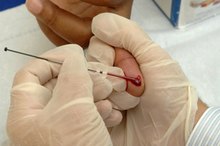About Nerve Damage Due to Donating Blood
Giving blood is touted as one of the easiest, most inexpensive and selfless things a person can do. Many people donate multiple times a year, potentially saving the lives of three people every time they donate. Some people, however, donate less frequently or not at all because they are afraid of the needles, loss of blood, pain and adverse side effects that they associate with blood donation. Though it's normal to feel a little bit of pain or wooziness right after donating, individuals who are hesitant to give blood because they think it will cause permanent nerve damage shouldn't worry too much, as this is an extremely rare phenomenon.
Cause
Nerve damage can occur when a phlebotomist, the person taking the blood donation, fails to insert the needle properly into an individual's arm. Though this alone will not cause nerve damage, if the phlebotomist does not know the proper anatomy of the arm and pokes the individual in incorrect places, acts careless and pokes the individual too quickly or violently or inserts the needle in one part of the arm and begins moving it around to inappropriate places, nerve damage can occur.
Symptoms
Disadvantages to Donating Plasma
Learn More
Light to moderate pain at the site of the puncture wound is normal after a blood donation. This pain may occur only when an individual moves their arm, places weight or resistance on their arm or straightens their arm. It may also occur continuously for the next 24 hours or so. Many people mistake this lingering pain, as well as any bruising that may have occurred from the needle puncture, to nerve damage. This is not, however, nerve damage. One should note that it is extremely rare for nerve damage to occur as a result of a blood donation. Dysesthesia can cause feelings of burning and itching, as well as the feeling that the arm is being dampened, given an electric shock or poked with needles. Nerve damage can also cause a loss or reduction of sensation in the arm, which may or may not be permanent.
- Light to moderate pain at the site of the puncture wound is normal after a blood donation.
- Many people mistake this lingering pain, as well as any bruising that may have occurred from the needle puncture, to nerve damage.
Considerations
Most every case involving an individual who suffered nerve damage after a blood draw has been caused by a careless, rushed or improperly trained phlebotomist. In other words, nerve damage caused by a blood donation is totally preventable. When it happens, and the individual is able to properly prove that the nerve damage was caused by the blood draw, the phlebotomist and their employer can be held accountable for the damages.
Other Conditions
Pros & Cons of Giving Blood
Learn More
In addition to nerve damage, people who donate blood may experience other problems during or after the donation process. Directly after a donation the donor may feel nauseous, sick to their stomach, dizzy or weak. This may also occur during the donation, though this is usually due to a fear of needles or the pain that results from the needle in the arm. When it happens after, however, it can signal low blood sugar or a drop in blood pressure if the individual stood up or maneuvered around too quickly following the donation. Black and blue bruising may also occur on the spot of insertion.
- In addition to nerve damage, people who donate blood may experience other problems during or after the donation process.
- This may also occur during the donation, though this is usually due to a fear of needles or the pain that results from the needle in the arm.
Misconceptions
Many people believe that if they've given blood before and had no problems with it then every donation after that will go smoothly. This is incorrect. Not only do bodies change physically over time, resulting in weight loss or gain, different nutrition habits and injuries that may aggravate the donation process, but every phlebotomist and donation will be different as well.
Related Articles
References
Writer Bio
Nellie Day is a freelance writer based out of Hermosa Beach, Calif. Her work can regularly be seen on newsstands, where her specialties include weddings, real estate, food and wine, pets, electronics, architecture and design, business and travel. Day earned a master's degree in broadcast journalism from the University of Southern California.









